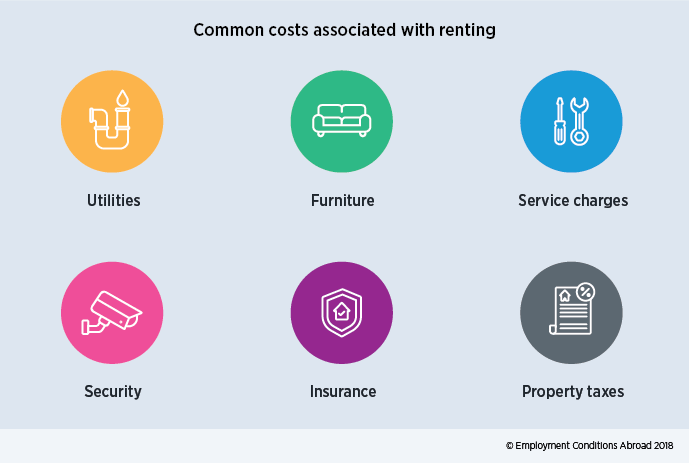Accommodation is often the most expensive component of a typical long-term international assignment package. With a high proportion of employers applying policies aimed at providing free housing to their mobile staff, keeping track of rents in global property markets is key. However, an assignee’s monthly rent payments may not represent the full scale of the accommodation costs that might be incurred by your assignees. There are a variety of different costs falling under the umbrella of housing that many employers choose to compensate for, either in full or in part.

One major category is costs that cover the upkeep of communal areas in a building or community. These can be known by a variety of terms: service charges, compound fees and maintenance fees are the most common. Some cities levy taxes tied to the value of a property, with tax revenue typically paying for services such as waste collection and road maintenance. Sometimes VAT or withholding tax is payable on top of the quoted monthly rent.
If furnished accommodation is sought, this will often require an increased budget in locations where most properties are offered to the rental market unfurnished. In some jurisdictions, renters are also legally required to take out insurance to cover the building and/or its contents for the duration of the tenancy. Utilities are one of the more expensive costs associated with renting and are charged separately to rent in most markets around the world.
For the purposes of this blog we are focusing on ongoing costs payable during a tenancy, rather than one-off costs at the start or end of an assignee’s lease (such as tenancy deposits and agency fees).
Rent is not the full picture
The suggested rental allowances in ECA’s Accommodation Reports reflect the way properties are advertised in their respective markets. In one city this advertised monthly rent may only cover the ‘base rent’ of the property. In a different city the monthly amount may cover certain costs on top of the rent. Service charges or compound fees are the most common cost to be included within the advertised monthly rent for a property. This is the case in China, where the upkeep of communal facilities is paid for out of the advertised monthly rent. Where service charges are not included, they are typically calculated as a percentage of the monthly rent or determined by the property’s total floor size. Some utility costs may also be included within the rent in some markets, such as in Vietnam where utility costs are usually included in the rent for apartments.
The chart below shows typical costs for a mid-range two-bedroom apartment in a variety of cities around the world. In some locations, such as Moscow, the advertised rent will cover most of the common additional accommodation costs, with only utility costs payable on top of the rent. Conversely, in Sao Paulo, significant additional payments are required to cover an apartment’s furnishings, service charges, utilities and property taxes.
© Employment Conditions Abroad 2018
What should your level of support be?
Naturally, given the varieties of assignment packages used by global mobility teams around the world and the number of categories of additional costs that assignees might incur, organisations vary in their approaches to financially supporting their assignees. A recent policy survey conducted by ECA, Benefits for International Assignments, gives an overview.
In general accommodation benefits are still a major part of most assignee packages, with 89% of employers providing financial assistance. Most of these employers either pay the assignee’s rent directly or provide a cash allowance intended to cover the rent. Half of employers providing assistance intend to provide their assignees with furnished accommodation.
Utility costs are handled in various ways by global mobility functions, with 58% of employers providing some level of support. Some consider them tied to day-to-day expenditure, including the cost of utilities as part of cost of living indices. Meanwhile 41% of employers cover the cost of service charges and property taxes where they are not included within the advertised rent. Only 21% of employers assist with the cost of home insurance.
Irrespective of your organisation’s approach to housing (and related costs), there are general principles that we recommend. Considering the variety of costs that may be incurred by your assignee, awareness is key. We always recommend scrutinising an assignee’s tenancy agreement to determine which costs may already be included within the monthly rent for a property. Some landlords may make the payment of certain additional costs, such as home insurance, a mandatory requirement.
Finally, we advise taking care when writing assignment letters for your mobile staff, so that they are treated equitably across your host locations. Your assignees may incur housing-related costs in some locations that do not apply in others, such as snow clearing or pool cleaning costs. Your organisation may need to allow for flexibility in the manner of your financial support. It might be tax-efficient to provide housing support as a benefit-in-kind in some jurisdictions, while in other jurisdictions a cash allowance may be more appropriate.
FIND OUT MORE
Find out more about managing the additional costs associated with renting by viewing our latest webinar on the subject.
ECA’s Accommodation Reports are available as part of a subscription to ECA’s data or can be bought individually though our website. They include details of the additional costs associated with renting to equip you with the information you need to budget for all the most common property costs your assignee may incur on top of their monthly rent.
ECA's comprehensive accommodation data for 300 locations is also available in our Accommodation Tool. The tool enables you to set and manage a consistent housing policy across all your assignment locations and quickly look up data in tables and maps to respond to challenges and queries.
Please contact us to speak to a member of our team directly.